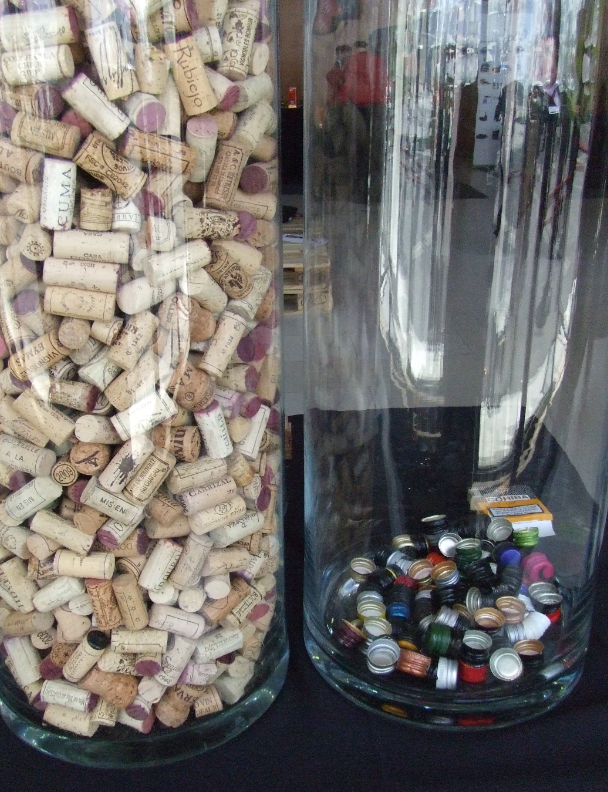By SUHBASH ARORA — from The INDIAN WINE ACADEMY Newsletter, July 16, 2012
 For many wine drinkers, the sight of screwcaps on a bottle indicates a cheap wine. But screwcaps they have become increasingly popular with winemakers around the world including India, even as the opponents believe corks are a must for ageing wine. But now University of California, Davis, has been commissioned to conduct an independent two-year study to evaluate the closures.
For many wine drinkers, the sight of screwcaps on a bottle indicates a cheap wine. But screwcaps they have become increasingly popular with winemakers around the world including India, even as the opponents believe corks are a must for ageing wine. But now University of California, Davis, has been commissioned to conduct an independent two-year study to evaluate the closures.
The Bottle Aging Closure and Variability study is being conducted in partnership with the PlumpJack Group, a corporation using both screw caps and corks for premium labels. The two-year study aims at comparing the effectiveness of screwcap as compared to natural and synthetic cork as wine closures. Bottles of 2011 Cade Napa Valley Sauvignon Blanc, the Fumé styled barrel fermented wine from Cade Winery owned by the Group, has been chosen for the study.
Sustained amounts of oxygen may lead to degradation in taste and colour. Unlike corks, a screwcap (or screwtop) doesn’t let oxygen into the bottle. It also ensures that a wine won’t get corked (provided it was not corked during the processing because of unhygienic conditions in the cellar) – cork can be tainted by the chemical compound TCA (2,4,6-Tri Chloro Anisole) during its manufacture, leading to musty wines.
Questions like whether a bottle of screwcap wine age as gracefully as a bottle with a cork, or screwcaps trap unpleasant hydrogen sulfide aromas that might otherwise be vented by porous corks, are being addressed in this independent study. The goal is to provide direction to the industry so that vintners can make informed decisions.
« While natural corks have been used effectively for thousands of years, they are no longer a sustainable method of closure, » said Andrew Waterhouse, a Professor of viticulture and enology at UC Davis. « With this study we hope to scientifically analyze the effectiveness of other closure methods and provide information and directions to the industry. »

The two-year study will analyze wines under three different types of closures generally in use — screwcaps, synthetic corks and natural corks. Glass enclosures (above pic) are apparently not a part of the study. The test group of 200 bottles of Cade Napa Valley Sauvignon Blanc 2011 will be monitored every few months using a spectrometer to detect changes in colour.
The wines will also be chemically analysed using oxygen sensors placed inside the bottles. The sensors allow the researchers to measure how a wine is aging without opening the bottle. The wines that show differences will be opened at the end of the study and tasted to determine if the quality has been compromised.
The study will determine the range of differences in each closure group, specifically how much oxygen has been allowed into the bottles. When oxygen interacts with a wine it causes oxidation, changing its colour and taste. Corks and screwcaps limit the amount of air the wine in the bottle is exposed to, preventing it from aging prematurely. « It’s really a variability study, » said Dr. Waterhouse. « We want to see how different they can be between themselves. »
The PlumpJack Group, which owns two wineries in Napa Valley including Cade, as well as two hotels, a wine shop and several restaurants, has been conducting in-house studies on the aging potential of screw caps since 1997 but decided to approach UC Davis, an independent body to assess the closures, making it an important study. It is not the first scientific study to be conducted on screw caps but it does employ new technology and is independent.
Though many vintners find it hard to market screwcaps to consumers, a company spokesman says the younger generation of wine drinkers is willing to embrace alternative closures.
The Indian Wine Industry has seen a paradigm shift during the last 5 years or so with a strong move towards screwcaps and the market accepting them (see comment below). The leading producer Sula has completely shifted to screwcaps barring their recent top-end variant Rasa, a barrique fermented Shiraz (retail price Rs.1100 in Delhi).
Similarly, the UB owned Four Seasons uses cork only for the Reserve range — Barrique Reserve Cabernet Sauvignon and Barrique Reserve Shiraz (retail price around Rs.900).
Grover Vineyards which had initially been reluctant to change when Sula had pioneered, shifted to screwcaps and today only their La Reserve is in the cork.
The common thread is the same in all the three top wineries-use screwcaps for young drinking wine and where aging potential is the key, they still owe allegiance to the cork.


From The Economic Times, Pune July 20, 2012
Global wine and brandy brands such as Moet and Chandon and Remy Martin are working with Indian winemakers to produce and bottle products here and set up base in the growing Indian market.
« At least 10 foreign companies are in talks with different wineries in India, » Jagdish Holkar, president of Indian Grape Processing Board, says. French champagne brand Moet and Chandon has started working with Nashik-based York winery. York is manufacturing sparkling wine for Moet, which is yet to hit the market.
Moet also plans to set up its own winery in India. Market sources say French brandy major Remy Martin is working with Sula Winery to make brandy from grape spirit in the country. Sula officials were not available to confirm this, despite repeated attempts.
Brandy made in India currently is not based on grape alcohol. So, it does not qualify as brandy, according to the international standards.
Two other Maharashtra-based wineries, Riona Wines and Fratelli are both Indo-Italian joint ventures working to make international standard Wines from Indian grapes.
The development marks the revival of the Indian wine industry after overproduction and a fall in demand following the economic recession hit wineries. Now, not only the Indian wineries are coming out of sickness after two years, but several international brands are also lining up to make a base in the country.
Most of the wine industry in India is concentrated in Maharashtra, which also leads and production and export of grapes. The wine industry in the state took off with the Wine Policy of the state government adopted in 2001.
Riona Wines, which has received interest-free loan from an Italian government undertaking, imports red wines, white wines and sparkling wines from Italy. It plans to make red and white wines from local grapes in 2012-13 season, its CEO KT Mane says.
Two Italian firms, Terre cortesi Moncaro and Enzo Mecella, have equity stake in Riona and provide technical support. Riona, based at Miraj near Sangli, has exclusive rights to import all their brands, Mane says.
Industry experts say the increasing presence of foreign wineries will improve the quality of Indian wines. « If foreign wine companies come to India, it will help improve the overall standards of wine making followed by the Indian wineries, » Kailash Gurnani, a winemaker working with York winery, says.
The Economic Times is published simultaneously from 11 cities—Mumbai (Bombay), Bangalore, Delhi, Chennai (Madras), Kolkata, Lucknow, Hyderabad, Ahemedabad, Nagpur, Chandigarh and Pune.
The Economic Times has its offices in Mumbai at The Times of India building, Dr. D. N. Road.